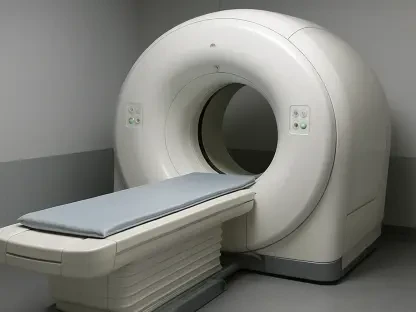In a landscape where healthcare systems worldwide grapple with escalating costs and overburdened facilities, a London-based health technology startup has emerged as a beacon of innovation with a substantial new investment. Wanda Health, specializing in AI-driven virtual care, has recently clinched €2.1 million in funding to advance its mission of transforming remote patient monitoring (RPM) and predictive analytics. This financial boost is poised to accelerate the company’s efforts in reducing hospital readmissions for patients battling chronic conditions such as heart failure and chronic obstructive pulmonary disease (COPD). With a platform that merges cutting-edge technology and real-time health insights, Wanda Health is addressing a critical need in modern healthcare delivery. The significance of this funding extends beyond mere numbers, reflecting a broader confidence in the potential of virtual care to alleviate systemic pressures and improve patient outcomes on a global scale.
Technological Innovation and Impact
Revolutionizing Virtual Care with AI
Wanda Health’s platform represents a significant leap forward in how healthcare providers can monitor and manage patient health remotely, utilizing an integration of wearable devices and sophisticated machine learning algorithms. This technology continuously tracks vital signs, identifying potential health risks before they escalate into emergencies. By enabling virtual check-ins, the system empowers medical professionals to intervene proactively, often preventing the need for hospital visits. Internal studies conducted by the company suggest an impressive reduction in readmissions by as much as 30%, a statistic that underscores the dual benefit of improved patient care and substantial cost savings for healthcare systems. This innovative approach positions the company at the forefront of a movement toward more personalized and responsive medical care, where technology acts as a bridge between patients and providers, even across vast distances.
The impact of such technological advancements cannot be overstated, particularly for those with chronic conditions who often face frequent hospital stays as part of their ongoing care. Wanda Health’s focus on predictive analytics means that subtle changes in a patient’s condition can be detected and addressed promptly, minimizing the risk of acute episodes. This not only enhances the quality of life for patients by allowing them to manage their health from the comfort of home but also alleviates the strain on hospital resources. Furthermore, the platform’s design aligns with the growing trend of digital health solutions that prioritize data-driven decision-making. As more healthcare providers adopt these tools, the potential for systemic change becomes evident, paving the way for a future where virtual care is a cornerstone of medical practice rather than a supplementary option.
Harnessing Data for Better Outcomes
Beyond the immediate benefits of real-time monitoring, Wanda Health’s use of AI delves deeper into the realm of predictive health management, offering a glimpse into how data can transform patient care. The platform analyzes vast amounts of health information to forecast potential deteriorations, providing actionable insights that guide clinical decisions. This capability is particularly vital for conditions like heart failure, where early detection of subtle shifts can mean the difference between a manageable situation and a critical emergency. By leveraging such technology, the company not only supports individual patient needs but also contributes to broader research and understanding of chronic disease patterns, potentially influencing future treatment protocols.
Additionally, the integration of wearable technology ensures that patients remain connected to their healthcare teams without the need for constant physical visits, a factor that enhances compliance and engagement. This seamless flow of data fosters a collaborative environment where patients and providers can work together toward common health goals. The significance of this extends to rural or underserved areas, where access to specialized care is often limited. Wanda Health’s platform bridges these gaps, ensuring that high-quality monitoring and intervention are available to a wider population. As the digital health landscape evolves, such innovations highlight the critical role of technology in democratizing access to care and improving overall health equity across diverse communities.
Funding and Strategic Growth
Scaling Operations with €2.1M Investment
The recent €2.1 million funding round secured by Wanda Health, following a £1 million equity investment in December 2024 led by EMV Capital Partners, marks a pivotal moment for the company’s growth trajectory. This infusion of capital is earmarked for enhancing the AI capabilities of the platform, refining predictive algorithms, and expanding the team to support broader operations. With a strategic focus on scaling in key markets such as the UK, US, and parts of Europe, the investment reflects strong investor belief in the company’s vision to redefine virtual care. These regions, characterized by aging populations and increasing demand for efficient healthcare solutions, present fertile ground for the adoption of remote monitoring technologies that can address systemic challenges.
Moreover, the funding will facilitate the forging of international partnerships, a critical step in navigating the diverse regulatory and operational landscapes of global healthcare markets. Wanda Health aims to tailor its solutions to meet the specific needs of different regions, ensuring that cultural and systemic nuances are accounted for in deployment strategies. This expansion is not merely about geographic reach but also about deepening the impact of virtual care in areas where hospital readmissions place significant financial and logistical burdens. By building a robust network of collaborators, the company is positioning itself as a leader in the healthtech space, ready to adapt and innovate in response to emerging needs and opportunities over the coming years.
Building a Foundation for Global Reach
The strategic allocation of these funds also underscores Wanda Health’s commitment to staying ahead in a competitive field by continuously improving its technological offerings. Enhancing AI tools is not just about maintaining a cutting-edge product but also about ensuring that the platform remains adaptable to future advancements in health technology. This forward-thinking approach is essential in a sector where rapid innovation can quickly render solutions obsolete if they fail to evolve. The focus on team expansion further supports this goal, bringing in expertise to drive research and development while strengthening market entry strategies in new territories.
Equally important is the emphasis on partnerships that can amplify the company’s impact on a global scale. Collaborations with healthcare providers, technology firms, and regulatory bodies will be crucial in overcoming barriers to adoption and ensuring compliance with local standards. These alliances can also provide valuable insights into patient needs and system inefficiencies, guiding the refinement of Wanda Health’s platform. As the company builds this foundation, the potential for creating a scalable model of virtual care becomes increasingly tangible, offering a blueprint for how healthtech can address universal challenges while respecting regional differences in healthcare delivery.
Addressing Healthcare Challenges
Reducing Hospital Readmissions
Hospital readmissions represent a formidable challenge for healthcare systems globally, with the UK’s National Health Service (NHS) alone incurring billions in costs annually due to this issue. Wanda Health’s platform offers a compelling solution by enabling patients with chronic conditions to manage their health from home, significantly reducing the need for repeated hospital visits. By focusing on early intervention through remote monitoring, the technology helps catch potential issues before they necessitate acute care. This approach not only eases the financial and logistical pressures on hospitals but also enhances patient autonomy, allowing individuals to play a more active role in their treatment plans while maintaining regular contact with medical professionals.
The alignment with value-based care models further amplifies the platform’s relevance, as reimbursable RPM codes create financial incentives for healthcare providers to adopt such technologies. This synergy between clinical benefit and economic viability makes Wanda Health’s solution particularly attractive in an era where cost-effectiveness is a priority for strained systems. Beyond immediate outcomes, the reduction in readmissions contributes to long-term improvements in resource allocation, freeing up hospital capacity for critical cases. As more providers recognize these advantages, the adoption of virtual care platforms could herald a significant shift in how chronic disease management is approached, prioritizing prevention over reaction.
Supporting Systemic Efficiency
Beyond the direct impact on readmissions, Wanda Health’s technology supports broader systemic efficiency by streamlining communication and coordination between patients and healthcare teams. The platform’s ability to deliver real-time data ensures that medical decisions are informed by the most current information, reducing delays and errors that often exacerbate health issues. This efficiency is particularly crucial in overburdened systems where time and resources are at a premium, allowing staff to focus on high-priority needs while maintaining oversight of stable patients through digital means. The ripple effect of such improvements can enhance overall service delivery, setting a new standard for operational effectiveness in healthcare.
Additionally, the focus on at-home care aligns with patient preferences for less invasive and more convenient treatment options, which can improve satisfaction and adherence to medical advice. By reducing the frequency of hospital interactions, Wanda Health’s platform also minimizes exposure to hospital-acquired infections, a persistent concern in clinical settings. This multifaceted impact highlights the potential for virtual care to address not just immediate health challenges but also the underlying inefficiencies that plague modern healthcare. As adoption grows, the lessons learned from implementing such technologies could inform policy and practice, fostering a more resilient and responsive medical ecosystem.
Healthtech Industry Trends
Optimism Amid Funding Volatility
After a challenging 2024 marked by funding constraints in the healthtech sector, a wave of cautious optimism has emerged, with early-stage startups like Wanda Health attracting significant capital to fuel their growth. The €2.1 million secured by the company is part of a larger trend where investors are increasingly drawn to virtual care solutions that promise both clinical impact and scalability. High-profile deals across the industry, coupled with the sustained momentum of the telehealth boom following the COVID-19 era, have positioned firms in this space as potential candidates for initial public offerings or acquisitions by major players. However, this optimism is tempered by persistent challenges, including funding volatility that can affect long-term planning for emerging companies.
Regulatory hurdles also loom large, with stringent requirements under frameworks like GDPR in the EU and HIPAA in the US creating barriers to rapid adoption of healthtech innovations. Competition from established giants further complicates the landscape, as startups must differentiate themselves in a crowded market. Despite these obstacles, the buzz around Wanda Health, reflected in industry analyses and social media discussions, points to a growing recognition of the transformative potential of AI-driven care. As investor confidence builds, the sector appears poised for a period of dynamic growth, provided that emerging players can navigate the complex interplay of market and regulatory demands.
Positioning in a Growing Market
Wanda Health’s strategic focus on predictive analytics for chronic disease management places it within a lucrative and rapidly expanding niche of the $50 billion global RPM market. This segment is gaining traction as healthcare systems worldwide seek solutions to manage aging populations and rising chronic illness rates effectively. Industry observers note a palpable excitement around startups that blend advanced technology with tangible health outcomes, often citing Wanda Health as a standout for its innovative algorithms. This recognition is bolstered by the broader shift toward proactive, tech-enabled healthcare, where prevention and early intervention are becoming central to care delivery models.
The potential for acquisitions or partnerships with larger industry players adds another layer of intrigue to Wanda Health’s position in the market. As companies like Philips or Siemens Healthineers look to bolster their digital health portfolios, startups with proven technologies become attractive targets. Such developments could accelerate the globalization of virtual care solutions, addressing universal challenges like resource strain while adapting to local needs. While the path forward includes navigating competitive pressures and regulatory complexities, Wanda Health’s niche expertise and recent financial backing provide a strong foundation for sustained growth and influence in the evolving healthtech arena.
Reflecting on Milestones Achieved
Reflecting on the journey so far, Wanda Health’s achievement of securing €2.1 million in funding stands as a testament to its innovative approach to virtual care through AI and remote monitoring. This milestone, built on the momentum of a prior £1 million investment, highlights the trust placed in the company’s vision to address the pressing issue of hospital readmissions. The reported success in reducing readmissions by up to 30% offers a powerful proof point, demonstrating how technology can enhance patient outcomes while easing financial burdens on healthcare systems. Looking ahead, the focus should shift to leveraging this capital to refine technological capabilities and strengthen global partnerships. Prioritizing regulatory compliance and market-specific adaptations will be crucial in sustaining momentum. As the healthtech sector continues to mature, Wanda Health’s trajectory provides valuable insights into balancing innovation with practical impact, suggesting a future where virtual care could fundamentally reshape healthcare accessibility and efficiency.









